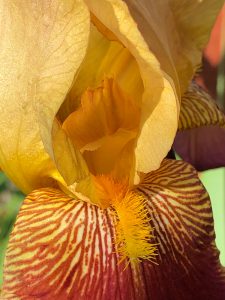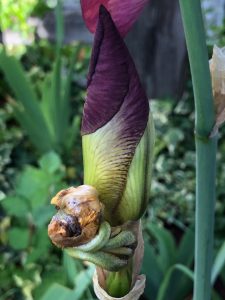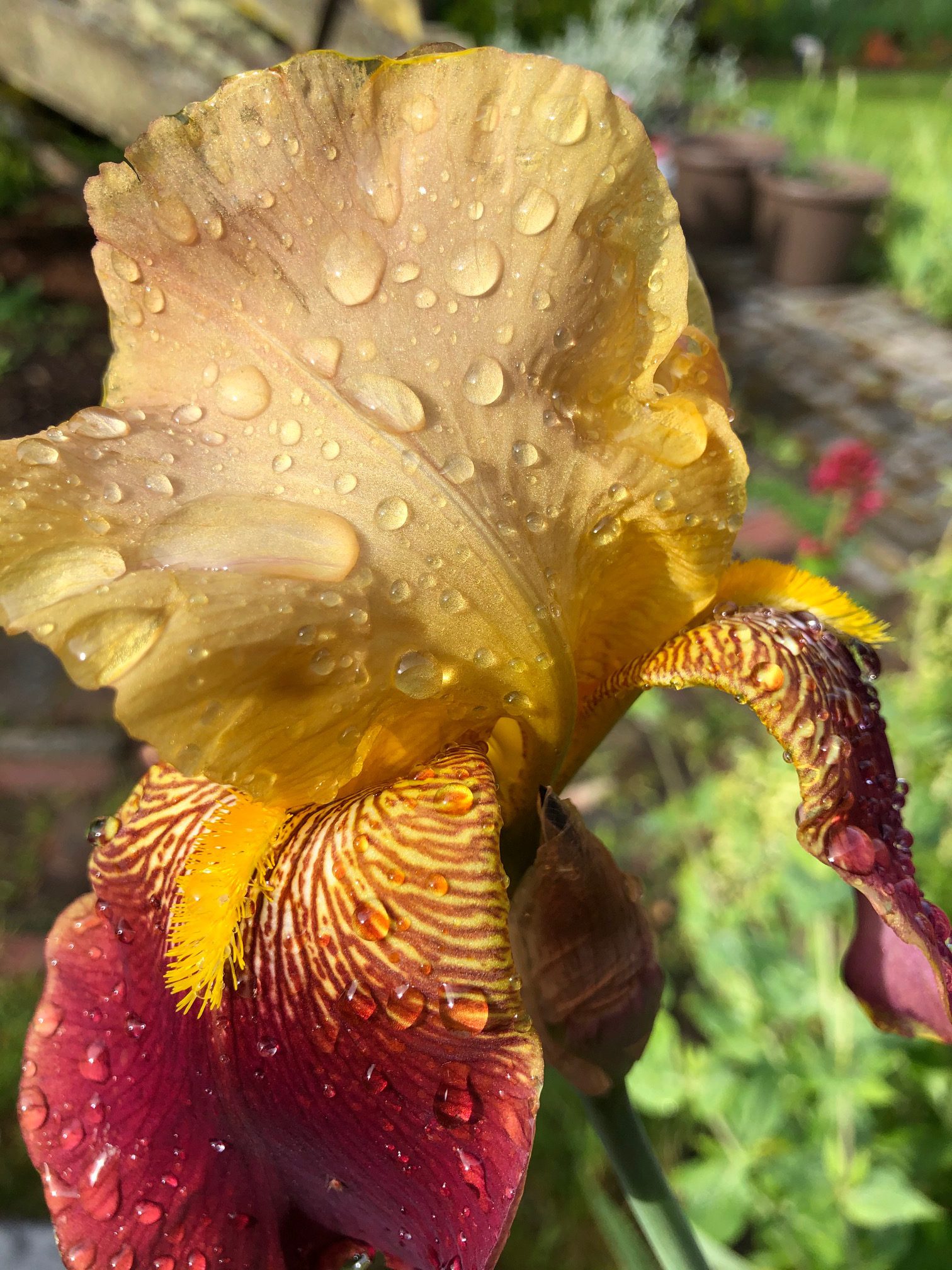It always snows here at the end of April, big white drifts of cherry blossoms, like little spirits. Lower branches go first, then uppers, nodding at a teasing sou’easter as masses of pale corollae go slant-petaling down past grizzled treebark. You never see the moment of tremble and separate, you just see them fly. April is a time of flowering trees and daffodils. In May, ground gardens feel more sure of themselves.
A woman cried out on Twitter: My brother died of #Covid-19 today. Her voice a flickering candle in a hurricane. Three thousand people clicked on the heart and tried to comfort her with tweets. All were birds in a windstorm. Our shared trauma is too big to not try and gather around to comfort strangers, but it’s too pre-verbal to know what to say. A friend lost her baby two weeks before Mother’s Day, she was 30 weeks pregnant and it just died in her womb. Another friend lost her mother. I cannot imagine having to grieve alone, with only time as companion. Yet I grieve, because their losses feel personal. Everything feels personal these days. Even time.
So I look time straight in the eye and say, “How do you do, I’m here now, can we get along?”
And time says, “You don’t really know me, do you?”
And I say, “Well, patience has never been my strong suit, but I did once watch frost forming.”
And time replies, “Why not sit for a spell?”
So I did, and time gave me an early morning bloom bursting forth from its tissue-paper cocoon to the wildness that is Iris, a thing to behold. Have you ever looked at an Iris up close? Those punk yellow mohawks, the trembling royal velvet skin, (for it feels moist, more like skin than petals), and that crown of top folds, cryptic with the next glory? Outside my window, my companion smiled and nodded in dulcet colors topped with shrieking bands of neon fur surrounded by tiger stripes.

The pure, joyful, fleeting sensuality of it…
You know? I thought, Sometimes I feel like an iris, too, all passion and shriek on the outside over my soft-skinned secrets.
After getting an eyeful of every detail, I left for for my morning walk, confident it would be there when I returned, but it was not to be. It had collapsed, the hydrostatic pressure inside its cells unable to diffuse enough water to maintain the plumpness needed to keep an iris upright. Its time had come. The parts of the stem that had supported all that glory gathered the shrunken flower and curled around it like a hand, as if in sympathy. It grew quiet and still next to a new emergence of iris wildness.


For many busy lives, it’s been habitually impossible to force our attention spans to sit still long enough to notice things that happen at the speed of other lives. What is the speed of a flower? A cherry tree? A continent? What is the speed of geologic time, and is it faster than the speed of the universe? Can I witness time’s passage without looking away after a few minutes? What is the speed of a human life? Can it be lengthened if we slow down?
This has been a Springtime of noticing. Each day on my early morning walks, I try to notice something I’ve never seen before. For four weeks I took the same route, just to see if I could find something new, to surprise myself. Could I sustain being in the moment? With a passing view of familiar houses, trees, and small gardens, you’d think it might not be possible that anything new would yield itself and that my attention would drift. But I noticed something new every day. Amazing.
This year the unwanted gift of endless time in quarantine has brought me more into the present, and into closer relationship with trees, flowers, clouds and wind—as well as with myself. We humans, whose mortal molecules are made of the same borrowed stardust as irises and cherry blossoms, are part of the flow of all these other lives.

“What is the speed of a human life? Can it be lengthened if we slow down?”
What grand questions you posed. I have often contemplated the same, but never have an adequate answer. Time is a constant…constantly baffling. On an intellectual level, I know that 2010 was ten years ago, but two events that occurred a day apart feel like years apart in my memories. I went to Bethel Woods(where Woodstock took place) in June of 2010 to see Ringo Starr and his All-Starr Band. The next day I went to a casino for the very first time. The concert seems like yesterday…visiting the casino… much longer ago than 10 years. I have no rationale for this. But possibly to answer your second question first…maybe if it never seemed that long ago things happened a short time ago, our lives could be lengthened…and therefore the speed of a lifetime slowed.
What an interesting way to look at time, Marc. While it feels fixed (and too often rushed) it often behaves as if it’s pliable. And we know it is because of relativity. When your brain focuses as intensely as yours did, or when something happens where you have to think fast to avoid, say, an accident, time can feel like it’s slowing down. Other things that weren’t as important fade. But when you spend a day in the not intense activity of watching frost grow, or an iris opening and then collapsing, time does something else for which there aren’t any words, but the closest one would be “expand.” Is it memory, or time itself that expands? Thanks for commenting.
I don’t think I understood on any conscious level that I longed for for a press and send on the reset button. For me this time has felt like a long slow exhale and the beginning of recovery from the ‘ way that it was ‘. Even getting and recovering from the virus has felt like an opportunity for reflection.
Thanks Karen, I love your posts. Stay well my friend.
OMG Cate, you had the virus? I hope you’re feeling better and have no after-effects. But what an observation about a subconscious longing for a reset. You are on the other side of that pre-verbal fear of getting it; I hope you’ll write about how that feels. Thank goodness you’re recovering.
This virus is complicated. The time I spent with it felt like a duel with an enemy disguised as a bunch of really weird symptoms, and a duel it clearly expected to win. Each day ‘ it ‘ showed me a different side of itself, although at the time, I had no idea what ‘ it ‘ even was. Most days I would converse with the ‘ thing ‘ inside of me, like hey you thing, what are you going to bring me this day. Dizzy? Fever? Death? This virus is strong enough that I decided not to fight it, but rather to try to understand both it and the opportunity for growth something like this can offer if you’re weird enough to think along those lines. Covid 19 seems to be a pretty apt metaphor for what’s happening politically and environmentally in our poor beleaguered world. Press the resent button in your life, there’s a lot to learn from this time of the virus. Stay well.
Wow. Covid as metaphor for life in the time of virus-addled politics. It’s a hall of mirrors. Thanks Cate, and I’m grateful you’re still with us.
Beautiful piece you wrote! So much time for thought these days. I believe that our busy lives actually rob us of time. That is the gift of this pandemic. Slowing us all down and giving us the opportunity to be more present. I take my walks everyday and like you, am always looking for new things. I often take my camera or at least my phone to capture some incredible beauty that most people might walk right by. I’ve become grateful for every minute even when the minutes and the days seem long. We may not have the interaction with others that we are so accustomed to but we can interact with nature in profound ways as you have shown and be better human beings for it. Thanks for sharing!
Thank you, Melissa. It’s not a bad thing to become better acquainted with our own selves, especially in uncertain times. What attracts one person to take a photo of something that others pass by? I think it was too easy for too long to avoid that contemplative stillness of the mind that comes with a stretch of time. Were we afraid of it? Maybe. What a freeing feeling to discover the deep connection we’ve always had to other lives being lived all around us.
When one thinks about time, reality can become very strange indeed. First, by traveling fast, time slows down for you and not those left behind. With new super high-speed photography available today light itself can be stopped. Time-laps photography can speed up the growth of grass growing. Meditation can change one’s perception of time. In my view reality is what you perceive to be. There is “accepted” civil time and an individual’s perceived time and the only time that counts is the “be here now time.”
Well said, Leif.